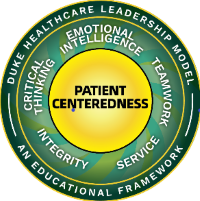The Leadership Education and Development (LEAD) Curriculum was developed as an integrated curriculum for all Duke medical students that spans the four years of Doctor of Medicine (M.D.) education, teaching emotional intelligence, integrity, teamwork, selfless service, and critical thinking.
The first two years of the LEAD program includes lectures, workshops, clinical skills foundations, and team-based learning (TBL) activities. The LEAD faculty also coach students during their patient simulations at the end of the first year. In subsequent years, curricular touchpoints help guide students mature their leadership skills as they learn and practice clinical medicine.
Course Director
Chris Prater, MD
LEAD Faculty
Cecily Peterson, MD
Chan Park, MD
Dean Taylor, MD
Fatima Syed, MD, MSc
Joe Doty, PhD

The leadership competencies from the Duke Healthcare Leadership Model and Educational Framework are the foundation for the LEAD Program and provides a framework for interpersonal and team leadership skill development.
- Patient Centered – Acting with focus on the values and goals of patients.
- Emotional Intelligence – The ability to recognize and understand thinking and emotions in yourself and others; and to use this awareness to effectively manage your behavior and relationships.
- Developing Self-Awareness: being aware of one’s own values, principles, and assumptions and how they interplay within the team dynamic.
- Cultivating Personal Resilience: ability to cope with and contextualize demanding situations.
- Maintaining Personal Balance: prioritizing activities to maintain mental and physical health as well as cultivate a positive outlook.
- Cultural Humility: the ability to maintain an interpersonal stance that is other-oriented in relation to aspects of cultural identity that are most important to the person.
- Critical Thinking – Using all available sources of knowledge to create appropriate and effective solutions while being aware of internal and external biases.
- Teamwork – Collaborating and maximizing one’s role to enhance team performance and cohesion.
- Integrity – Being honest and acting in accordance with strong moral principles in one’s personal and professional life.
- Service – Prioritizing others’ needs over individual wants and desires, while maintaining personal and professional balance.
- Advocating for patients at all levels of the healthcare system.
- A purposeful commitment to patients’ health needs with learned knowledge, compassion, and benevolence.
Foundational Curriculum
| Activity | Time Frame | Description | Objectives |
|---|---|---|---|
| The Patient | MS1-Immersion | Observation of a conversation between physician and patient about their journey through healthcare together |
Explore the complex, multi-dimensional patient journey through the healthcare system Understand the importance of the physician-patient (family-patient) relationship Recognize the negative psychosocial impact of illness on patients and the potential mitigation through helpful and healthful relationships with their physician and healthcare team |
| Team Charters | MS1-FPC1 | First year students will write team charts with the facilitation of LEAD faculty for their gross anatomy and TBL groups |
Practice negotiating a Team Charter within a non-hierarchical team Improve team function Practice personal and team accountability Manage group expectations with a team consisted of different learning and communicating styles |
| DiSC Seminar | MS1-FPC1 | Students will explore personality tests using the DiSC framework as it applies to learners in medicine |
Practice self-awareness in a team setting Understand how different communication styles are used by different team members Apply diverse team dynamics to improve team function |
| Clinical leadership skills | MS1-FPC2 |
Series of didactics exploring professional wellness, giving and receiving feedback, and emotional intelligence in the clinical setting |
Explore how personal values interact with life in medicine
Practice appropriate response in both a professional and clinical setting Engage in feedback delivery and reception |
| Leadership in the clinical setting | MS2 - PIONEER | Small group exercises to explore emotional intelligence, critical thinking, and integrity in clinical care |
Explore how medical students can practice leadership skills throughout medical training Apply principles of teamwork to enhance group communication |
| Book club | Yearly - elective | Book club of relevant titles in medicine and healthcare | |
| Capstone integration | MS4/5 - Capstone | Application of clinical skills with LEAD skills at the end of medical training |